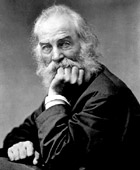WALT WHITMAN was born in Westhills, Long Island, May 31, 1819, in a farm-house overlooking the sea. While yet a child his parents moved to Brooklyn, where he acquired his education. He learned type-setting at thirteen years of age. Two years later he taught a country school. He contributed to the "Democratic Review" before he was twenty-one years old. At thirty he traveled through the Western States, and spent one year in New Orleans editing a newspaper. Returning home he took up his father's occupation of carpenter and builder, which he followed for a while. During the War of the Rebellion he spent most of his time in the hospitals and camps, in the relief of the sick and disabled soldiers. For a time he was a department clerk in Washington.
In 1856 he published a volume entitled "Leaves of Grass." This volume shows unquestionable power, and great originality. His labors among the sick and wounded necessarily made great impressions; these took form in his mind and were published under the title of "Drum Taps."
His poems lack much of the standard of recognized poetic measure. He has a style peculiar to himself, and his writings are full of meaning, beauty and interest. Of his productions, Underwood says: "Pupils who are accustomed to associate the idea of poetry with regular classic measure in rhyme, or in ten-syllabled blank verse or elastic hexameters, will commence these short and simple prose sentences with surprise, and will wonder how any number of them can form a poem. But let them read aloud with a mind in sympathy with the picture as it is displayed, and they will find by nature's unmistakable responses, that the author was a poet, and possessed the poet's incommunicable power to touch the heart." He died in Camden, N. J., March 20, 1892.
Biography from: http://www.2020site.org/poetry/index.html |






